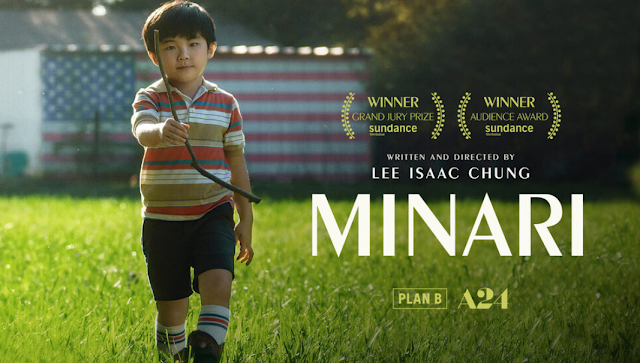Welcome to another entry in the Oscar Film Journal, here at Enuffa.com!
Well I've completed my viewing of every 2020 Best Picture nominee, and rounding out the list is Lee Isaac Chung's semi-autobiographical drama Minari, about a family of Korean immigrants who move to rural Arkansas in the early 80s. The father Jacob plans to start a Korean vegetable farm serving the growing number of countrymen and women immigrating to the region, supplementing his funding by taking a chicken-sexing job (that's separating baby chicks by gender to weed out the males who aren't useful for either meat or egg production). Jacob's wife Monica, having grown up in the city, isn't excited about leaving their former life in California to move to the country, and would've been content to remain in the chicken sexing business if it meant being able to provide for their two children. But Jacob wants something more than a menial 9-to-5 job, and their conflict about what's best for the family plays out throughout the film. To make life more palatable for Monica, Jacob arranges for her mother Soon-ja to relocate from Korea and provide childcare, and her relationship with their son David (a rather disagreeable six-year-old with a heart condition) takes center stage during the film's second act.
Minari is a quiet, contemplative film with very relatable themes - chasing one's dreams as opposed to just being a worker bee, wanting to do so without needing to rely on other people, making choices between one's family and the self (when of course those two things often aren't mutually exclusive), and of course failure. Countless films have been made about pursuing the American Dream since the advent of cinema, and Minari puts a personal and unusual twist on this classic format, with a film steeped in old-school American "values" for lack of a better word, but from the point of view of an immigrant family who speak their native language most of the time (The Hollywood Foreign Press Association drew deserved criticism for nominating Minari as a Foreign Language film instead of as a Best Picture candidate, on the grounds that over 50% of its dialogue was in a non-English language - an absurdly arbitrary metric).
Steven Yeun (of Walking Dead fame) delivers a subtle performance as Jacob, often stubborn and prideful, convinced he can rely on his wits and mettle to both make a success of his farm and also win Monica's support. Han Ye-ri as Monica masks growing resentment toward what she sees as Jacob's self-gratification and risk-taking over his commitment to providing a stable home for his family, while convinced David's heart condition will worsen. The film's show stealer though is Youn Yuh-jung as Monica's mother, free-spirited, unbound by convention, and brutally frank with both her daughter and her grandchildren, to the point that David doesn't consider her a real grandmother because she doesn't do the things he expects from a grandmother. The David-Soon-ja power struggle is perhaps the most enthralling thread in the movie.
Minari is an example of what I would call gentle filmmaking, literary in its narrative approach, capturing moments, letting the story breathe, not beating the viewer over the head with ideas or events but rather allowing the viewer time to digest them. I definitely sensed a Terrence Malick vibe in Chung's approach, but without the confusing pretentiousness; this is a very easy story to identify with. Definitely worth a look.
I give the film *** out of ****.


No comments:
Post a Comment